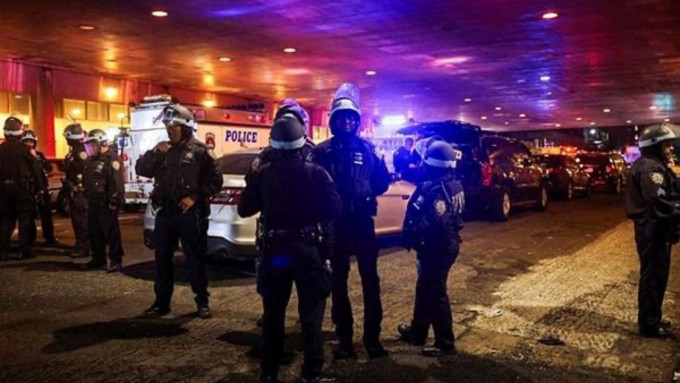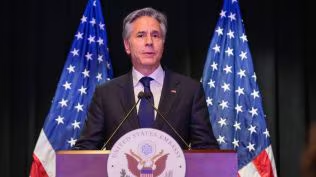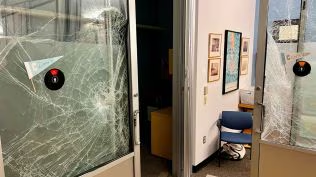Protests at US campuses, arrests at Columbia University and the ‘anti-semitic’ debate: All you need to know
The recent events at Columbia University have been marked by intense pro-Palestinian protests, which culminated in a police raid to arrest demonstrators and dismantle a protest encampment on campus. The protests, part of a broader wave of student activism across the US, have sparked debates on freedom of expression, antisemitism, and the Israeli-Palestinian conflict.
What happened at Columbia?
The New York City police raided Columbia University late on Tuesday, arresting dozens of pro-Palestinian demonstrators, some of whom had seized an academic building, and to remove a protest encampment the Ivy League school had sought to dismantle for nearly two weeks.

Shortly after police moved in, Columbia University President Minouche Shafik released a letter in which she requested police stay on campus until at least May 17 – two days after graduation – “to maintain order and ensure that encampments are not re-established”.
Within three hours, the campus had been cleared of protesters, said a police spokesperson. At the start of the raid around 9 pm ET, throngs of helmeted police marched onto the elite campus in upper Manhattan, a focal point of student rallies that have spread to dozens of schools across the US in recent days in opposition to Israel’s war in Gaza.
Police entered through a second-story window, using a police vehicle equipped with a ladder. Students standing outside the hall jeered police with shouts of “Shame, shame!” Police were seen loading dozens of detainees onto a bus, each with their hands bound behind their backs by zip-ties, the entire scene illuminated with flashing red and blue lights of police vehicles.
 NYPD law enforcement officials stand by on closed streets surrounding Columbia University in a comprehensive operation to clear campus of students who barricaded themselves in a building on campus and established an encampment while protesting in support of Palestinians. (Reuters)
NYPD law enforcement officials stand by on closed streets surrounding Columbia University in a comprehensive operation to clear campus of students who barricaded themselves in a building on campus and established an encampment while protesting in support of Palestinians. (Reuters)
“Free, free, free Palestine,” chanted protesters outside the building. Others yelled “Let the students go”. “Columbia will be proud of these students in five years,” said Sweda Polat, one of the student negotiators for Columbia University Apartheid Divest, the coalition of student groups that has organized the protests.
She said students did not pose a danger and called on police to back down, speaking as officers shouted at her and others to retreat or leave campus. Protesters were seeking three demands from Columbia: divestment from companies supporting Israel’s government, greater transparency in university finances, and amnesty for students and faculty disciplined over the protests.
President Shafik this week said Columbia would not divest from finances in Israel. Instead, she offered to invest in health and education in Gaza and make Columbia’s direct investment holdings more transparent. The occupation began overnight when protesters broke windows, stormed inside, and unfurled a banner reading “Hind’s Hall,” saying that they were renaming the building after a 6-year-old Palestinian child killed in Gaza purportedly by the Israeli military.
The eight-story, neo-classical building has been the site of various student occupations dating back to the 1960s. At an evening news briefing held a few hours before police entered Columbia, Mayor Eric Adams and city police officials said the Hamilton Hall takeover was instigated by “outside agitators” who lacked any affiliation with Columbia and are known to law enforcement for provoking lawlessness.
Police said they based their conclusions in part on escalating tactics in the occupation, including vandalism, use of barricades to block entrances, and destruction of security cameras. One of the student leaders of the protest, Mahmoud Khalil, a Palestinian scholar attending Columbia’s School of International and Public Affairs, disputed assertions that outsiders led the occupation.
Why are students protesting?
The protests began in response to Israel’s military offensive in Gaza following a deadly attack by Hamas militants on southern Israel in October 2023. The protests have since spread to dozens of college campuses across the United States, with students demanding that their universities divest from companies supporting Israel’s government and show greater transparency in their finances.
At Columbia, the protests have been organized by a coalition of over 100 student groups called Columbia University Apartheid Divest (CUAD). The group has been seeking three main demands from the university: divestment from companies supporting Israel’s government, greater transparency in university finances, and amnesty for students and faculty disciplined over the protests.
The university administration and student protesters had been engaged in failed negotiations for nearly two weeks. On Monday, the university warned the protesters that they faced suspension if they did not dismantle the encampment by 2 pm that day. Instead, the protesters defied the ultimatum and occupied Hamilton Hall, an administrative building on campus.
The ‘anti-semitic’ debate
The October 7 attack on southern Israel by Hamas militants from Gaza, and the ensuing Israeli offensive on the Palestinian enclave, have unleashed the biggest outpouring of US student activism since the anti-racism protests of 2020. Many of the demonstrations across the country have been met with counter-protesters accusing them of fomenting anti-Jewish hatred.
The pro-Palestinian side, including Jews opposed to Israeli actions in Gaza, say they are being unfairly branded as antisemitic for criticizing Israel’s government and expressing support for human rights. The issue has taken on political overtones in the run-up to the US presidential election in November, with Republicans accusing some university administrators of turning a blind eye to anti-semitic rhetoric and harassment.
White House spokesperson John Kirby on Tuesday called the occupation of campus buildings “the wrong approach”.
The crackdown at Columbia, at the center of Gaza-related protests roiling university campuses across the US in recent weeks, occurred as police at the University of Texas at Austin arrested dozens of students whom they doused with pepper spray at a pro-Palestinian rally. Since then, students at dozens of campuses from California to New England have set up similar encampments to demonstrate their anger over the Israeli operation in Gaza and the perceived complicity of their schools in it.
The pro-Palestinian rallies have sparked intense campus debate over where school officials should draw the line between freedom of expression and hate speech. Students protesting Israel’s military offensive in Gaza, including some Jewish peace activists, have said they are being censured as anti-semitic merely for criticizing the Israeli government or for expressing support for Palestinian rights.
Other Jewish groups counter that anti-Israel rhetoric frequently delves into or feeds overt forms of anti-Jewish hatred and calls for violence, and thus should not be tolerated. Such reasoning was brought to bear by groups that pressured the University of Southern California two weeks ago to cancel the graduation speech of its class valedictorian, Asna Tabassum, a Muslim student, over her perceived pro-Palestinian views.
 A Public Safety officer looks at the encampment on the university grounds as protests continue at Columbia University. (Reuters)
A Public Safety officer looks at the encampment on the university grounds as protests continue at Columbia University. (Reuters)
The Los Angeles-based university later announced it was canceling the entire main-stage commencement ceremony for its May 10 graduation. On Monday, the head of the Los Angeles Urban Policy Roundtable, Earl Ofari Hutchinson, called on USC President Carol Folt to convene an “emergency campus student-administration dialogue” to diffuse tensions on campus.
Universities where the protests are ongoing
Columbia University
Pro-Palestinian students occupied an academic building and set up an encampment on campus, demanding divestment from companies supporting Israel’s government and greater transparency in university finances.
The university responded by restricting access to campus and suspending students who have participated in the protests.
University of Texas at Austin
Police arrested dozens of students at a pro-Palestinian rally, using pepper spray and flash-bang charges to disperse the crowd.
The university has been criticised for its handling of the protests, with some accusing it of using excessive force.
University of California, Los Angeles
Security was tightened on campus after physical altercations between dueling factions of protesters.
The university has canceled its main graduation ceremony and warned that anyone involved in blocking classroom access could face expulsion or suspension.
University of Southern California
The university canceled its main graduation ceremony and a commencement speech by its pro-Palestinian valedictorian, citing safety concerns. Protesters met with university President Carol Folt to discuss their concerns, but details of the meeting were not disclosed.
Virginia Tech
A protest at the university resulted in 82 arrests, including 53 students, after protesters occupied the lawn of the graduate life center. The university advised those gathered to disperse, warning that those who failed to comply would be charged with trespassing.
University of North Carolina at Chapel Hill
About 30 people were detained by campus police after protesters refused to leave the encampment. The university had warned protesters that they needed to remove tents and other items and leave the area by 6 a.m. or risk arrest.
University of Florida
Nine people, including six students, were arrested at the university after protesters refused to comply with warnings to leave the campus. The university had warned that students could face suspension and employees could be fired if they violated a series of rules.
University of Michigan
The university told students, staff, and faculty that its upcoming commencement ceremonies could include demonstrations. A demonstration at the centre of the campus had grown to nearly 40 tents, with the university noting that interfering with speakers and events is not protected speech.
Virginia Commonwealth University
Demonstrators clashed with police after officers tried to remove a makeshift encampment, with some protesters hurling water bottles and other objects at police. The university said 13 people, including six VCU students, were charged with unlawful assembly and trespassing.
Portland State University
Police dragged students off by their hands and feet, snapping the poles holding up tents and zip-tying those who refused to disperse. The university says it’s against code to camp overnight on school property and the students were given several warnings to disperse before police were called in.
University of Minnesota
Student protest groups posted on social media that their encampment of dozens of tents and hundreds of people was still standing, even after police ordered them to disperse. More than 10 university buildings remained closed by the university in anticipation of continued protests.
George Washington University
Demonstrators tore down metal barricades confining them to University Yard and set up more than a dozen tents in the middle of a street. The university said it will move law school finals to a different building because of noise from the protests.
Emory University
Police in riot gear and on horseback moved against protesters, taking dozens into custody before charges were dropped for lack of probable cause. The university has been criticized for its handling of the protests, with some accusing it of using excessive force.
(Nada is an intern with indianexpress.com)
Disclaimer: The copyright of this article belongs to the original author. Reposting this article is solely for the purpose of information dissemination and does not constitute any investment advice. If there is any infringement, please contact us immediately. We will make corrections or deletions as necessary. Thank you.





